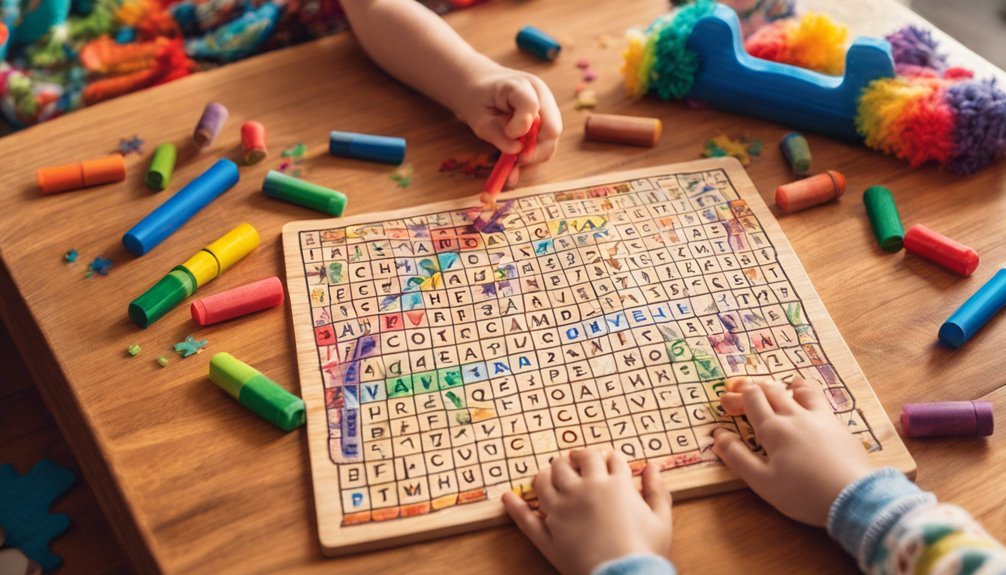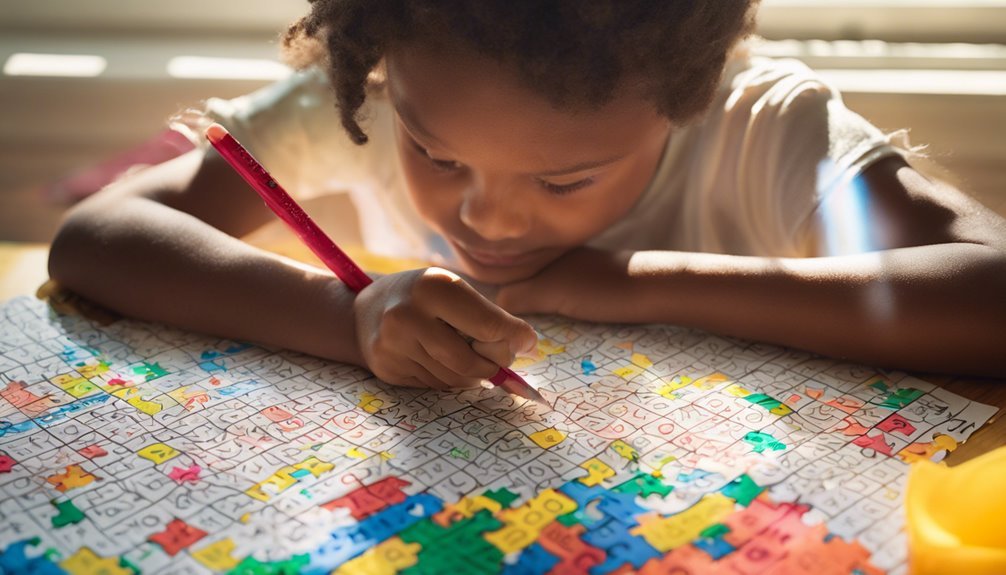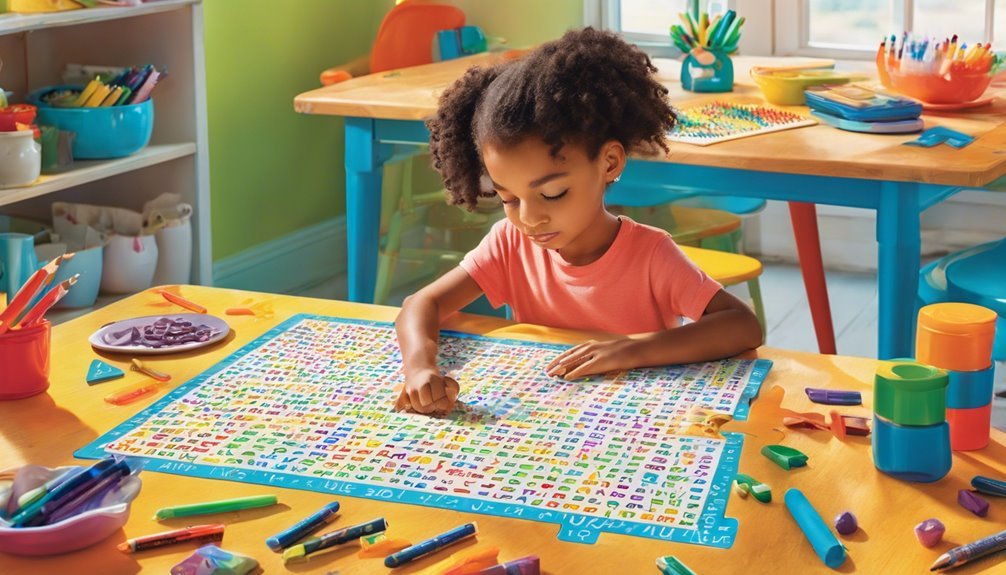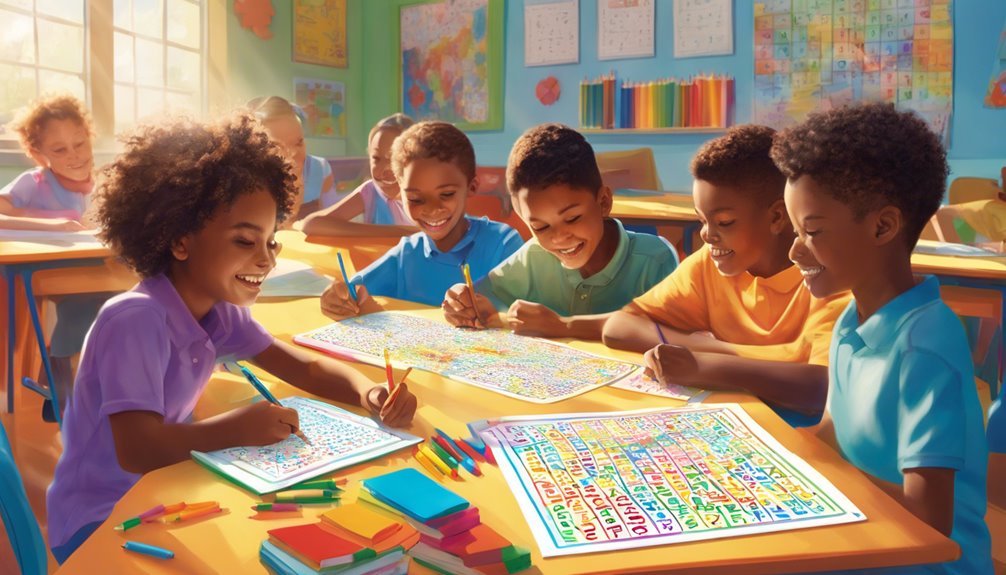"Cherishing Little Steps - A Haven for Baby and Family Journeys"
How Word Search Puzzles Can Help Kids Improve Focus and Attention
Have you noticed how challenging it can be for kids to stay focused for long periods? It's a common struggle in today's fast-paced world. Word search puzzles offer an engaging way to help children develop their attention span and cognitive skills. As they search for hidden words, they not only enhance their focus but also build essential traits like patience and persistence. Understanding how this simple activity can influence their growth may surprise you.
Key Takeaways
- Word search puzzles require sustained attention, helping children practice focusing on specific tasks for extended periods.
- Engaging with these puzzles enhances vocabulary, which supports cognitive development and facilitates better communication with peers.
- The problem-solving aspect of word searches encourages critical thinking, fostering adaptability and resilience in challenging situations.
- Completing puzzles builds patience and persistence, teaching children to remain calm and focused even when faced with difficulties.
- Collaborative word search challenges promote social interaction, enhancing attention during group activities and teamwork among kids.
The Importance of Focus and Attention in Childhood Development
As children navigate their formative years, the ability to focus and pay attention becomes crucial for their overall development. When you foster their focus, you're not just enhancing their cognitive development; you're also building childhood resilience.
This resilience helps them tackle challenges and adapt to new situations effectively. Concentration skills allow children to absorb information, solve problems, and engage in complex tasks, laying a foundation for lifelong learning.
Moreover, attention facilitates social interactions, enabling them to connect with peers and adults. By recognizing the importance of focus, you can implement strategies that nurture these skills, ultimately empowering children to thrive academically and emotionally.
In doing so, you're equipping them with the tools they need for future success.
What Are Word Search Puzzles?
Fostering focus in children can take many forms, and one enjoyable way to do this is through word search puzzles. These types of puzzles challenge kids to find hidden words within a grid, providing not just entertainment but also significant educational benefits.
Here's how they can help:
- Enhance Vocabulary: Exposure to new words fosters language development.
- Improve Concentration: Searching for words requires sustained attention.
- Encourage Problem-Solving: Kids learn to strategize as they navigate the grid.
- Boost Memory: Remembering word locations strengthens recall skills.
How Word Search Puzzles Enhance Cognitive Skills

While many activities engage children's minds, word search puzzles uniquely enhance cognitive skills in a way that's both fun and educational. By searching for words, kids develop cognitive flexibility, allowing them to switch between different tasks and approaches more easily. This adaptability is crucial for effective problem solving, as it encourages them to think outside the box when faced with challenges.
As they navigate the grid, children learn to recognize patterns and make connections, sharpening their critical thinking abilities. Moreover, the focused attention required to spot words helps improve concentration, laying a solid foundation for future learning.
Engaging with word search puzzles equips kids with essential skills that extend beyond the puzzle, fostering a lifelong love for learning and discovery.
Boosting Visual and Spatial Awareness Through Puzzles
Word search puzzles not only cultivate cognitive skills but also play a significant role in boosting visual and spatial awareness. As you engage with these puzzles, you enhance your visual perception and spatial reasoning, leading to greater overall cognitive function.
Here are a few ways they help:
- Pattern Recognition: You learn to spot patterns quickly, improving your ability to identify shapes and letters.
- Attention to Detail: You focus on every letter, honing your attention to finer details in visual stimuli.
- Directional Awareness: You navigate the grid, strengthening your spatial orientation skills.
- Memory Enhancement: You recall word placements, enhancing your short-term memory.
Incorporating word searches into your routine can effectively sharpen these vital skills, paving the way for improved focus and attention.
The Role of Patience and Persistence in Completing Puzzles

Completing puzzles requires not just skill but also a significant amount of patience and persistence. When you sit down to tackle a word search, you might find some words elude you, testing your resolve.
This is where patience practice comes into play; it teaches you to stay calm and focused, allowing your mind to sift through possibilities without frustration. As you work through the puzzle, each moment of persistence builds your ability to concentrate and enhances your problem-solving skills.
Encouraging a Growth Mindset With Word Search Challenges
Engaging with word search challenges can significantly foster a growth mindset in children. When you encourage them to embrace these puzzles, it teaches valuable lessons about challenge acceptance.
Here's how word searches can promote this mindset:
- Problem-Solving Skills: Kids learn to strategize as they search for words, enhancing critical thinking.
- Resilience: They experience setbacks when they can't find a word, but this builds perseverance.
- Self-Reflection: After completion, kids can assess their strategies, encouraging a deeper understanding of their progress.
- Celebration of Effort: Completing a challenging puzzle reinforces the value of effort over immediate success, instilling a positive attitude towards future challenges.
Incorporating Word Searches Into Daily Routines

Incorporating word searches into your child's daily routine can transform mundane moments into engaging learning opportunities. Consider setting aside a specific time each day—perhaps after school or during breakfast—where your child can dive into a puzzle. This not only fosters a sense of structure but also builds anticipation for engaging activities.
You might also use word searches as a calming transition between tasks, helping your child refocus their attention. By integrating these puzzles consistently, you encourage cognitive skills while reinforcing the importance of focus.
Fun Variations of Word Search Puzzles for Kids
Word search puzzles can be made even more exciting with a few fun variations that keep kids engaged and eager to participate.
Consider incorporating themed puzzles and interactive formats to boost their interest. Here are some ideas to try:
- Seasonal Themes: Create puzzles around holidays or seasons, featuring relevant words.
- Story-Based Searches: Integrate a short story where the words to find are key elements of the narrative.
- Timed Challenges: Set a timer to see how quickly kids can find all the words, adding a competitive edge.
- Collaborative Searches: Encourage teamwork by having kids work in pairs to find words together.
These variations not only enhance focus but also make learning enjoyable.
Success Stories: Kids Who Improved Their Focus With Puzzles

Many parents have noticed significant improvements in their children's focus after introducing puzzles into their daily routine. These success stories highlight how engaging in word search puzzles can sharpen attention and enhance cognitive skills.
For instance, one parent shared that their child, who once struggled to concentrate during homework, now completes tasks with greater ease after solving puzzles regularly.
The puzzle benefits extend beyond mere enjoyment; they teach kids to search for patterns and develop patience. This newfound focus often translates into better performance in school and improved behavior at home.
Frequently Asked Questions
Are There Specific Age Groups That Benefit Most From Word Search Puzzles?
Absolutely, specific age groups do benefit more from word search puzzles.
Young children, around ages 4 to 7, experience significant cognitive development, enhancing their vocabulary and pattern recognition.
As they progress into early elementary years, around 8 to 10, these puzzles help strengthen focus and attention skills.
Each age group reaps age-related benefits, fostering critical thinking and problem-solving abilities.
How Often Should Kids Do Word Search Puzzles for Best Results?
If you want your kids to become word search wizards, daily practice is key! Aim for 15 to 30 minutes per session, as this duration keeps them engaged without overwhelming them.
Regularly tackling these puzzles helps sharpen their skills and boosts their confidence. Mix up the difficulty levels to keep things fresh and challenging.
You'll notice improvements in their problem-solving abilities and focus, making it a fun and rewarding experience for everyone involved!
Can Word Search Puzzles Be Used for Special Needs Children?
Absolutely, you can use word search puzzles for special needs children.
These puzzles promote word recognition, making it easier for them to identify and connect with words. Additionally, they can assist in sensory integration by engaging multiple senses, which helps create a more enjoyable learning experience.
Tailoring the puzzles to their interests and skill levels can enhance motivation, providing a fun and effective way to support their cognitive development while fostering focus and attention.
What Materials Are Best for Creating Homemade Word Search Puzzles?
Creating homemade word search puzzles is like crafting a treasure map for your brain! For the best results, use sturdy paper types like cardstock or construction paper to withstand eager hands.
Choose puzzle themes that resonate, such as animals, hobbies, or favorite movies, to keep it engaging. Markers or colored pencils add a touch of creativity, making the process enjoyable.
With these materials, you'll master the art of puzzle-making in no time!
Are There Any Online Resources for Printable Word Search Puzzles?
Yes, there are plenty of online resources for printable word search puzzles.
You can explore websites like Education.com or Puzzle-Maker.com, which offer customizable options.
These online tools allow you to select themes and difficulty levels, ensuring you'll find something suitable for any age group.
By utilizing these printable resources, you'll have a wealth of engaging puzzles at your fingertips, ready to challenge and entertain.
Don't hesitate to dive in and start creating!
Conclusion
Incorporating word search puzzles into your child's routine can genuinely transform their focus and attention. Did you know that studies show engaging in such activities for just 20 minutes a day can significantly enhance cognitive skills? As they immerse themselves in these fun challenges, they not only sharpen their minds but also build patience and resilience. By making puzzles a regular part of their lives, you're nurturing essential skills that will benefit them academically and personally for years to come.

